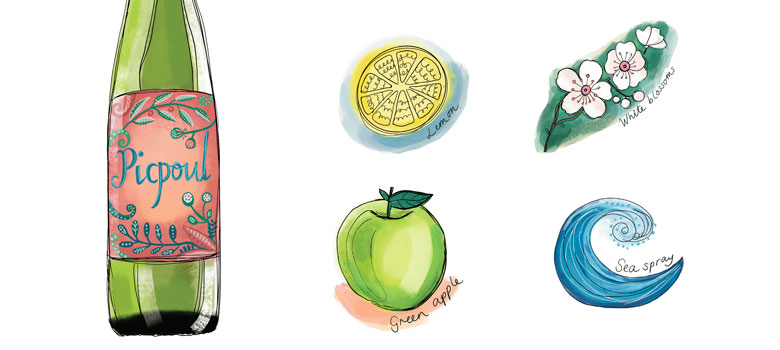
Wine
Facts on Picpoul
Known as the ‘lip stinger’ and once a major ingredient in vermouth, picpoul is a french variety with zesty appeal.
Picpoul is an ancient French variety with its roots firmly buried in the sandy soils of the southern French region of Languedoc-Roussillon. Historically, it was used to make a dry white wine called Picardin of which millions of litres were shipped north along the French canals.
But perhaps its more important role was as an ingredient in Vermouth production. The name Pique-poul translates literally as “stings the lip,” and is a reference to the grape’s mouthwateringly high acidity.
In 2013, the Picpoul de Pinet AOC was created and is now the most famed incarnation of the variety, accounting for sales of 10 million bottles a year worldwide. The UK alone imports almost 60 percent of the region’s production.
The Picpoul de Pinet AOC vineyard area is located behind the Etang de Thau, a large lagoon on the edge of the Mediterranean Sea. The sea breezes work like an air conditioner to cool the grapes.
The variety is planted in the southern Rhône Valley as well. It is used sparingly in Châteauneaf du Pape, where it is found under the name of Piquepoul.
In Australia
Picpoul came to be in Australia via six vine sticks wrapped in wet newspaper. Mark Lloyd from Coriole had discovered the variety when in France and saw the potential for it to thrive in McLaren Vale’s Mediterranean climate.
Mark uncovered a nursery that was happy to supply him with free vine cuttings and these sticks were then replanted in McLaren Vale. Coriole’s Picpoul enjoyed immediate success and they struggled to meet demand.
Despite this, Picpoul plantings remain small throughout Australia. South Australia’s McLaren Vale and the Barossa are the epicentre, however, look out for examples from the Central Ranges GI in NSW.
In fact, Moonlight Flat Oysters in Bateman’s Bay established the Central Ranges vineyard specifically to create Picpoul to match with their oysters.
It is a variety of great promise in Australia. Its ability to retain acidity in hot climates is a plus for grape growers in warm climate regions and its dry, fresh and nervy style suits the palates of Sauvignon Blanc and Pinot G lovers.
Did you know?
Much like Pinot or Grenache, there are three different colour clones of Picpoul - Blanc, Gris and Noir. The Gris is very rare, and the vast majority of plantings are of the Blanc clone. The grape is grown in small amounts in Spain and Portugal where it goes by the name of Picapoll and Avello.
Classic Characters
Picpoul is renowned for its high acidity and can also be dry and nervy. It can show white florals and saline aromatic on the nose, but the main characters are lemon zest and green apple. The wines are light bodied, but can have some textural grip underpinning the fruit.
Food Matches
Picpoul is renowned as ‘the wine for oysters’, but works remarkably well with any white fish or shellfish.
Its acidity makes it the perfect contrast to deep fried food and its light body means it can complement vegetable based dishes.